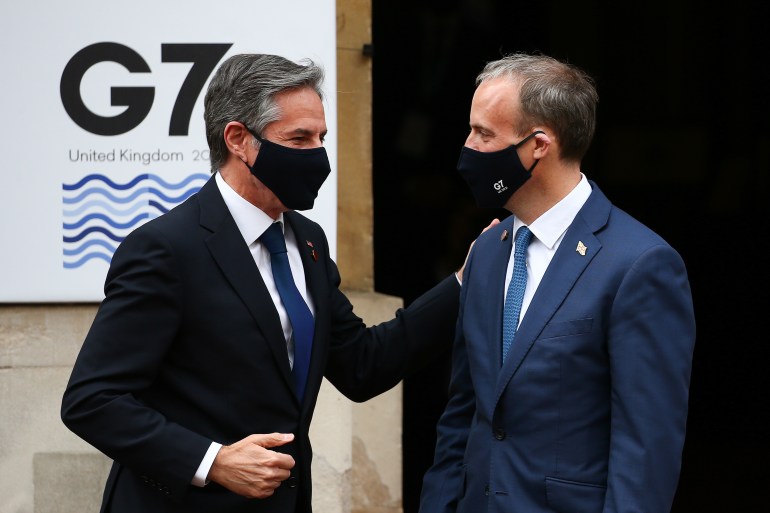Today, Tuesday, the G7 foreign ministers discussed in London the possibility of forming a united front against China, which is increasingly proving its influence on the international scene, during their first attendance meeting in more than two years, amid strict precautionary measures against the Corona virus.
In the aftermath of a dinner devoted to the Iranian and North Korean nuclear programs, the foreign ministers of the Group of Seven countries began formal talks in central London, and exchanged elbows saluting, as it became popular during the epidemic.
Their first meeting dedicated to China, the economic player that cannot be turned around, and whose desire to prove itself as a military power and exert influence in the world raises the concerns of Western capitals.
Precautionary measures against the Corona epidemic were present during the meeting of the Group of Seven (European) foreign ministers
"Our goal is not to try to stop China," US Secretary of State Anthony Blinken told reporters on Monday, adding, "What we are trying to do is impose respect for the global system that is based on rules, in which our country has invested a lot in the past decades (...) not only in the interest of our citizens." But also people in different parts of the world, including China. "
Blinken began "strong cooperation" with Britain to put pressure on Beijing regarding the suppression of the pro-democracy movement in Hong Kong and the suppression of the Muslim Uyghur minority in Xinjiang, which Washington described as "genocide."
Common Approaches
Because of their special relationships, London and Washington have adopted common approaches to foreign policy, especially with regard to Russia and China.
During a press conference on Monday, British Foreign Secretary Dominic Raab - whose country holds the rotating presidency of the Group of Seven - declared that "the door is open" to improving relations with China in order to work with it in a constructive way, especially in the field of climate change.
He added that this remains subject to behavior and behavior.
The foreign ministers of Germany, Canada, the United States, France, Italy, Japan and Britain are holding talks until Wednesday;
To agree on common responses to global threats.
On the agenda of the talks are the files of China, Burma, Libya, Syria and Russia, before the summit of heads of state and government next month in southwest England.
The foreign ministers will also discuss acts of violence in Ethiopia, the files of Iran, North Korea, Somalia, the Sahel and the Balkans, where there are many "pressing geopolitical problems that undermine democracy, freedoms and human rights," according to London.
British Foreign Secretary Dominic Raab (right) receives his American counterpart Anthony Blinken upon his arrival at the meeting (European) headquarters
After meeting on Monday with his US counterpart, Raab called for a unified approach, and said in a statement that "the British presidency of the Group of Seven constitutes an opportunity to bring together democratic and open societies and express unity in the most urgent times to face common challenges and growing threats."
The meetings between the participants will take place according to strict criteria due to the epidemic, with the reduction of the number of participating delegations, the imposition of masks and social distancing, while establishing transparent barriers between the participants.
Britain - which has recorded more than 127,500 deaths from the epidemic since its spread - is gradually easing restrictions, as vaccination campaigns advance and cases decline, while several other countries are witnessing an accelerated spread.
This disparity in the epidemiological situation has led to calls for greater international action, especially facilitating access to vaccines, and this will be the subject of discussion on Wednesday's meeting.
Ukraine's "steady support"
Representatives of the European Union will join the foreign ministers of Germany, Canada, the United States, France, Italy, Japan and Britain.
India, Australia, South Korea, South Africa and the Association of Southeast Asian Nations (ASEAN) were also invited to London.
Since leaving the European Union last year, Britain has set its sights on the Asia-Pacific region, and it also desires broader and stronger global pledges in the fight against climate change, as it prepares for the United Nations summit on climate change (COP26) in November / Next November.
After the G7 meeting, the US Secretary of State will travel to Kiev to confirm the US "steadfast" support for Ukraine after the deployment of Russian forces on the borders due to tension with Moscow.

